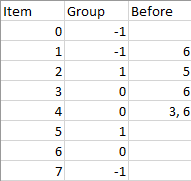Problem
There are n items each belonging to zero or one of m groups where group[i] is the group that the i-th item belongs to and it's equal to -1 if the i-th item belongs to no group. The items and the groups are zero indexed. A group can have no item belonging to it.
Return a sorted list of the items such that:
The items that belong to the same group are next to each other in the sorted list.
There are some relations between these items where
beforeItems[i]is a list containing all the items that should come before thei-th item in the sorted array (to the left of thei-th item).
Return any solution if there is more than one solution and return an empty list if there is no solution.
Example 1:

Input: n = 8, m = 2, group = [-1,-1,1,0,0,1,0,-1], beforeItems = [[],[6],[5],[6],[3,6],[],[],[]]
Output: [6,3,4,1,5,2,0,7]
Example 2:
Input: n = 8, m = 2, group = [-1,-1,1,0,0,1,0,-1], beforeItems = [[],[6],[5],[6],[3],[],[4],[]]
Output: []
Explanation: This is the same as example 1 except that 4 needs to be before 6 in the sorted list.
Constraints:
1 <= m <= n <= 3 * 10^4group.length == beforeItems.length == n-1 <= group[i] <= m - 10 <= beforeItems[i].length <= n - 10 <= beforeItems[i][j] <= n - 1i != beforeItems[i][j]beforeItems[i] does not contain duplicates elements.
Solution
class Solution {
private static int[] topoSort(int temp, ArrayList<ArrayList<Integer>> adj) {
int[] indegree = new int[temp];
for (ArrayList<Integer> edges : adj) {
for (Integer edge : edges) {
indegree[edge]++;
}
}
Stack<Integer> q = new Stack<>();
for (int i = 0; i < temp; ++i) {
if (indegree[i] == 0) {
q.push(i);
}
}
if (q.isEmpty()) {
return new int[0];
}
ArrayList<Integer> topo = new ArrayList<>();
while (!q.isEmpty()) {
int v = q.pop();
topo.add(v);
ArrayList<Integer> edges = adj.get(v);
for (int nbr : edges) {
indegree[nbr]--;
if (indegree[nbr] == 0) {
q.push(nbr);
}
}
}
if (topo.size() != temp) {
return new int[0];
} else {
int[] ans = new int[topo.size()];
for (int i = 0; i < topo.size(); ++i) {
ans[i] = topo.get(i);
}
return ans;
}
}
public int[] sortItems(int n, int m, int[] group, List<List<Integer>> beforeItems) {
ArrayList<ArrayList<Integer>> graph = new ArrayList<>();
int nodes = n + 2 * m;
for (int i = 0; i < nodes; ++i) {
graph.add(new ArrayList<>());
}
for (int i = 0; i < n; ++i) {
List<Integer> before = beforeItems.get(i);
if (group[i] == -1 && before.isEmpty()) {
// continue
} else if (before.isEmpty()) {
int groupStart = n + group[i] * 2;
int ge = n + group[i] * 2 + 1;
graph.get(groupStart).add(i);
graph.get(i).add(ge);
} else if (group[i] == -1) {
for (int temp : before) {
if (group[temp] == -1) {
graph.get(temp).add(i);
} else {
int ge = n + group[temp] * 2 + 1;
graph.get(ge).add(i);
}
}
} else {
int groupStart = n + group[i] * 2;
int groupEnd = n + group[i] * 2 + 1;
graph.get(groupStart).add(i);
graph.get(i).add(groupEnd);
for (int temp : before) {
if (group[temp] == -1) {
graph.get(temp).add(groupStart);
} else {
if (group[temp] == group[i]) {
graph.get(temp).add(i);
} else {
groupEnd = n + group[temp] * 2 + 1;
graph.get(groupEnd).add(groupStart);
}
}
}
}
}
int[] temp = topoSort(nodes, graph);
if (temp.length == 0) {
return temp;
}
int[] ans = new int[n];
int j = 0;
for (int k : temp) {
if (k < n) {
ans[j++] = k;
}
}
return ans;
}
}
Explain:
nope.
Complexity:
- Time complexity : O(n).
- Space complexity : O(n).